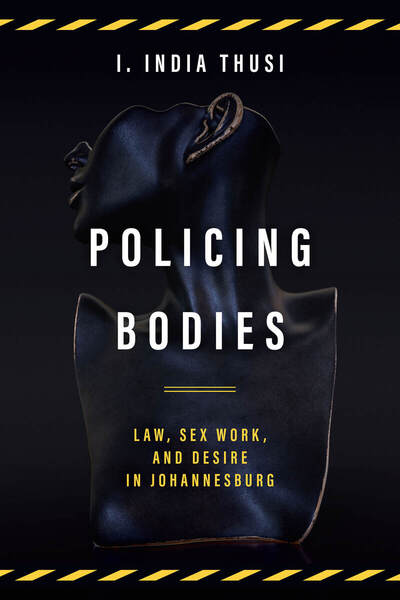Sex work—defined broadly as the exchange of sexual services for monetary compensation—occupies a legal gray area in Johannesburg, South Africa, where it is criminalized but largely tolerated, at least within certain unofficial red-light districts. Author I. India Thusi, a professor of law at Indiana University and senior scientist at the Kinsey Institute, investigates the uneasy relationship between sex workers and law enforcement, and the complexities of the cultural discourse surrounding sex work, in POLICING BODIES (Law, Sex Work, and Desire in Johannesburg), an ethnographic study combining on-the-ground observations and interviews with sex workers and police officers.
Thusi became interested in the topic of sex work while clerking for the Constitutional Court of South Africa, near the neighborhood of Hillbrow, a community known locally as a “den of iniquity” and red-light district. For two years, Thusi conducted fieldwork in Hillbrow, accompanying police officers while observing their interactions with sex workers, and conducting formal and informal interviews with both sex workers and police. POLICING BODIES examines how policing of sex work occurs, including the racial and sexual hierarchies that affect sex workers’ treatment, and investigates issues of human rights, regulation, and feminist attitudes towards sex work. As Thusi points out, sex work “challenges much of what we have been taught about human relationships and frustrates many of our own notions of morality” across the political spectrum: conservative observers denounce sex work on moral grounds as a violation of cultural norms, while for many feminists, it represents violence and victimization of women.
Among the fascinating insights Thusi offers in POLICING BODIES is that, while police officers generally support the decriminalization of sex work, their perception and treatment of sex workers is heavily influenced by a hierarchy of perceived beauty. The more beautiful the worker, the more “professional” and hygienic they are considered. This association of beauty—favoring women with “leaner bodies, lighter skin, and straighter hair”—and the perception of professionalism results in more beautiful workers receiving greater protection by police (who frequently patronize the hotel-brothers where these women work), while workers considered less hygienic receive less protection and tend to be mistreated. Concerning the feminist debate over the criminalization of sex work, Thusi rejects abolitionist arguments championed by radical feminists, arguing that questions of legality must give way to the more pressing consideration of sex workers’ lived realities and their welfare within a patriarchal society.
Although the scope of her study is limited to South Africa, I. India Thusi’s observations and conclusions are relevant to urban spaces around the world. Thorough in its examination and even-handed in its findings, POLICING BODIES offers a meticulously crafted analysis of the complex realities of sex work, arguing convincingly for its decriminalization and greater scrutiny and reform of its policing.
~Edward Sung for IndieReader

